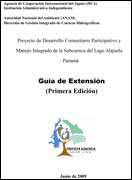- Home
- Technical Cooperation Projects
- Index of Countries
- Latin America
- Panama
- Project for Participatory Community Development and Integrated Management of the Alhajuela Lake Subwatershed
- Project News
- We published our Extension Guidebook (first edition)
Project News
2009-07-24
We published our Extension Guidebook (first edition)
Based on the experiences of Alhajuela Project, we created an Extension Guidebook as a tool for promoting participatory watershed management (watershed conservation). (The Guidebook can be downloaded from: 5. Extension Guidebook (first edition).)
The first draft was made in December 2008 and since then we were reviewing and revising the Guidebook both within the Project team and with the related authorities of ANAM (Directorate of Integrated Watershed Management, Directorate for Promoting Environmental Culture, and Directorate of Protected Areas and Wildlife) until June 2009 when the first edition was published.

Taking into account ANAM's policy to promote the implementation of watershed management projects nationwide, the basic orientation we chose for the Guidebook was that it should be "useful (applicable) to other watersheds in Panama." Each Chapter is composed of the following sections: "Objectives and procedural outline", "Methodology – the work involved and necessary techniques", "Inputs needed (personnel, material, expense and time)", and "Pending issues for future revision of Guidebook". It is structured in such a manner that a person in charge of a participatory watershed management (conservation) project can program the activities that would be necessary from the beginning of the project in a consecutive way. Also, for the convenience of users, in the Guidebook's Annex are lists of manuals and materials that are available on the subject, which we collected from inside and outside of Panama.
Some of the issues addressed in the Guidebook, such as the "economic independence of inhabitants" or the "development of activities on individual farms" still require further accumulation of experience or the application of techniques. These issues are clearly identified in the section titled "Pending issues for future revision of the Guidebook". We plan to develop these issues during the remaining half of the Project period, and at the end of the Project we will publish a second edition to include the results of these activities. (Note: The second edition will not be able to include all the pending issues.)
Following is a list of the Guidebook's chapters. (The complete Table of Contents can be downloaded from Cover Page (PDF/44KB).
【I. Introduction】
- Orientation of the fundamental institutional policies of ANAM and JICA regarding watershed management
- Objective of the Guidebook and the "Extension" process
- Composition of the Guidebook
【II. Initial Planning Process】
- Approaching the community inhabitants
- Obtaining basic data
- Forming groups and creating an activity plan for the initial phase
- Farmland Use Plan
【III. Basic Extension Stage】
- Strengthening the groups and their self-management ability
- Awareness creation and environmental education in watershed conservation
- Introduction of conservation and environment-friendly farming techniques
【IV. Strengthening of Activities】
- Sales promotion of products and services
- Economic administration and coordination
- Monitoring and evaluation
- Adoption of techniques on individual farms and horizontal dissemination
- Exit strategy
- Annex 1. Forms
- Annex 2. List of available guidebooks and manuals on conservation and environment-friendly farming techniques
- Annex 3. List of available guidebooks and manuals on participatory development tools
- Annex 4. List of available material on creating environmental awareness of farmers and providing environmental education to students
- Annex 5. List of organizations and contact persons that provide personnel to conduct training sessions
- Annex 6. List of organizations that provide support for obtaining outside funds
- Annex 7. Case studies from the experiences of Alhajuela Project
(Mr. Isao SAKAI, Chief Advisor / Rural Development)
